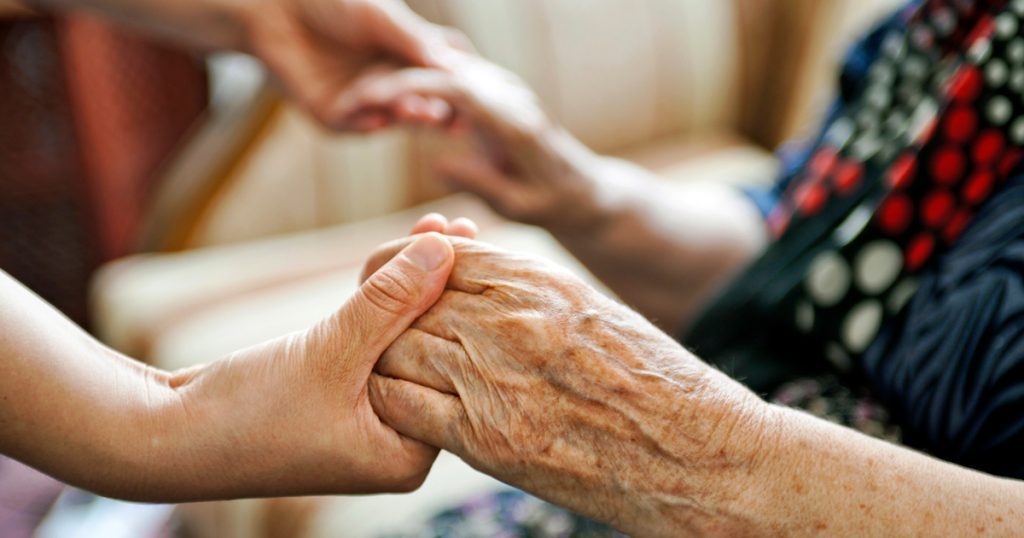It’s important to empathize with seniors transitioning into assisted or senior living homes because they experience stress, uncertainty, discomfort, and sometimes even physical pain. Empathy helps people from becoming insensitive to the challenges of aging.
Time is similar to a two-sided coin. Heads represent how time is experience, and experience cultivates wisdom. The tail of that same coin reveals time as a desensitizer.
You’ve heard the expression, “pain passes with time,” “give it a little time,” or “time heals all wounds.”
These sayings sound good and give us a false sense of security because most people will tell you physical wounds may disappear with time, but there are more than just physical wounds to address.
As owners of residential assisted living homes, many of us for several years now, we may become desensitized by time.
EVERYBODY DESERVES EMPATHY
Countless circumstances drive seniors into residential assisted living homes. Yet, could it be we have lost a sense of touch? A sense of understanding or empathy? Do the stories of our seniors fall on callous ears?
Certainly, it is not insinuated that owners of RAL homes are cruel, insensitive, or oblivious to the needs of our residents.
Father Time has a way of desensitizing us, making us numb to the feelings of others.
Seeing seniors in various states of declining health and mobility on a regular basis might make some caregivers numb. The fact remains that every senior has to cope with their own distinct and new reality of transitioning into assisted living.
They likely have no prior experience with this change. They lived a fruitful life until “it” happened. A drastic change in daily norms and waking up in a new environment can be incredibly scary.
YOUR CLOSET ISN’T BIG ENOUGH TO HOLD MY PAIN
Pain is relative to the one experiencing it. To that person, the pain can be unbearable, intolerable or a companion they have long learned to live with uncomfortably.
When seniors and their families visit a residential assisted living home or nursing home, they often experience pain to some degree. These people need our support, our assistance, our understanding. They need empathy.
How do residential assisted living homeowners encourage staff to empathize and embody this pain? How do we do all we can as a team ensure we are not underestimating or discounting the pain of our visitors and residents?
First, we do not put it in a closet. In other words, we do not quickly resolve it for them or push it to the side. This will only add to the pain.
So, how do we show and express genuine empathy? Below are 4 tactics that help to accomplish empathetic relations.
FOUR BLOCKS FOR BUILDING EMPATHIC RELATIONSHIPS
1. Deal with the Discomfort
In the assisted living industry, sales require less convincing and more listening. Discomfort is the stimulus of our clients and should be the stimulus of your staff. Regardless of the level of discomfort, when people cross our thresholds something has gone wrong.
Pursue this pain by listening. And when listening, do so actively. Maintain eye contact and ask probing, yet sensitive, questions. Remain engaged in the conversation. Put the lovely brochures to the side and get to know the pain of the potential resident and his/her family. Make having this hard conversation bearable, not easy. In order to do that, you must allow yourself to feel to some degree what they are experiencing.
Therefore, consider your very own loved ones each time. This will help you feel and express empathy. You, too, will feel the discomfort, but that connection will help them build trust in you and your RAL home.
2. Be the Discovery Guide
Sales in RAL is not based upon manipulative tactics, where you inadvertently guide the prospects to visualize your home as the answer to their troubles. In residential assisted living, sales is to help the prospects discover and express what their thoughts, feelings, and fears are in the midst of this stressful time. Things are often happening to them too fast for them to process.
So, it is incumbent upon RAL owners and operators to slow the pace down, guide them in this expression, so that they discover reality. When this happens, prospects can make sober decisions and find a partner in their struggle – which will result in another bed being occupied in your home.
3. Stop Talking Closets, please?
Bewildered, stressed, concerned, petrified, grieving, and angry are often the emotions many seniors and their families carry when visiting your assisted living home. This is an unwanted house hunting trip, so do not become a cheerful real estate agent. They do not want to buy this, but they must buy something somewhere for their loved one.
Therefore, again, use empathy. Understanding the circumstances that has brought them to your business will make the closet inconsequential. What they need is a loving, caring, enjoyable place for Mom, who is struggling to remember the names of her grandchildren.
4. The Bottom Line
Residential assisted living sales can be a relationship building exercise. At the core of RAL sales is the need to connect. Placing emphasis on building relationships allows sales agents to give and share themselves. It’s the flip-side of the coin – the desensitizer.
Residential assisted living sales should be 100% connection through empathy. Get in the moment with the prospect and share humanity with the family. It is essential to remember that one day, if you live long enough, you will find yourself on the opposite side of the same table. What do you want to experience when that happens?
EMPATHY SALES
In reality, every member of your RAL staff is a salesperson. Their products and services may vary based upon their purpose, but the client remains the same.
- All must be empathetic.
- All must listen more than they talk.
- All must allow themselves to feel the pain of their clients and/or prospects.
- All must picture their own loved ones and respond accordingly.
Great salespeople will tell you that they love their jobs. It is true that almost nothing is purchased without having been sold.
Historically, however, salespeople have been given a bad reputation. For instance, the used car salesmen who sold a lemon, the shoe salesmen who lied about quality, or the awful real estate agent. We’ve all heard these catastrophes.
However, what is not often shared are the examples of great salespeople, who really helped their clients. This can be you. While these folks do not receive as many accolades from the public, their names come up in conversation. These are the salespeople who are chronically referred to the close friends and family members of those they serviced well.
Why? Empathy.
Does the name of your residential assisted living sales agent come up in conversation? Nothing beats word of mouth. Does your RAL home find its prospects driven to you because of referral? Word of mouth is and has always been the absolute best marketing tool worldwide.
If you are finding that your assisted living home is not receiving many prospects via referral, maybe it’s time for a check-up. Get the clarity necessary to foster success. Remember, empathy is the greatest asset an assisted living sales agent can convey. Why? Because it is real and true.
EMPATHY DRIVES REVENUE
All too often, when empathy is taught to sales professionals, the revenue producing aspect of this strategy is ignored. This is irresponsible. It is often ignored by those who misconstrue manipulation with empathy.
Empathy undeniably drives revenue.
When people genuinely connect with a sales professional, they make a purchase. The purchase is worth it because of the connection made with the sales professional. Essentially, people buy into the person who is selling them a product, not the other way around. Therefore, it is essential that your RAL salespeople understand the true nature of empathy and sales.
Here are some helpful tips pertaining to empathetic selling in the residential assisted living industry.
TIPS FOR EMPATHETIC SELLING IN ASSISTED LIVING
- Avoid superficial conversation. Many people are uncomfortable having it and the prospects hate it. Be genuine.
- Empathetic selling is not a system. Why? People are not systems; they are living organisms with unique life experiences. No two are the same, even if their circumstances are identical. Allow each prospect the opportunity to be themselves and approach them for who they are, not what profile you want to address.
- Empathetic selling is not a process through which you take a prospect. Rather, it is allowing yourself to be a human being, while interacting with other humans who have a dire circumstance. It’s absolutely okay to be yourself. People like to get to know you, not just what you want them to buy.
- Empathetic selling is not a skill developed by reading a book. It is a genuine acceptance of being true to oneself first, then being honest with those whom we have the opportunity to serve.
- Empathetic selling can still be revenue focused. This is not a warm and fuzzy situation. People are experiencing pain and disappointment. The empathetic salesperson connects with people in severe discomfort, experiences that discomfort with them and provides the solution which they will gladly purchase.
RALNA HELPS TUNE-UP THE ASSISTED LIVING SALES PROCESS
Every residential assisted living business needs a tune-up from time to time. As an owner and/or operator always be prepared to get one for yourself. You cannot accomplish everything you need to be successful in this industry on your own, it takes a team.
The Residential Assisted Living National Association is here to provide information, resources and support for RAL owners and staff. We provide the kind of support that empowers owners and operators to administer quality senior care.
Find support by clicking here.
RALNA advocates for residential assisted living business owners and operators supporting them with guidance to legal expertise, continued education, national marketing, group purchasing power and a continual positive voice for the industry. RALNA understands what your business needs for optimal success.











